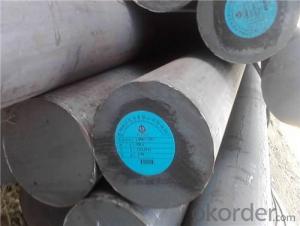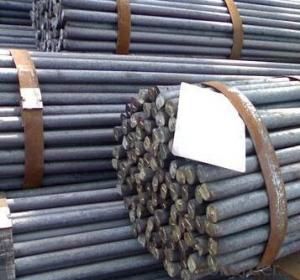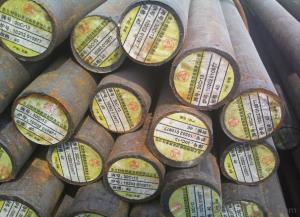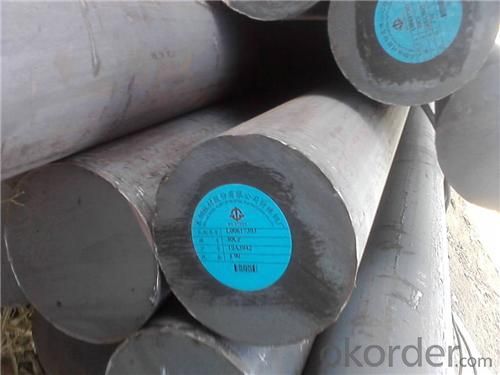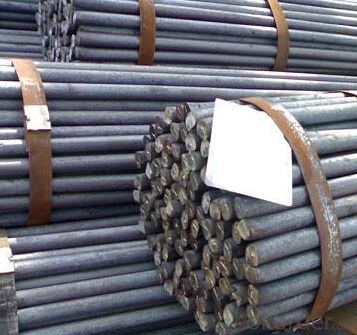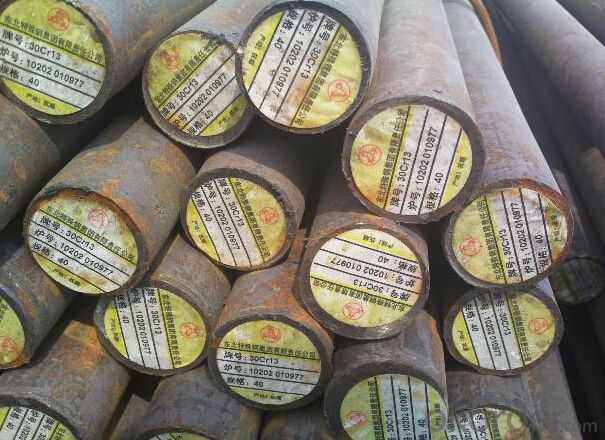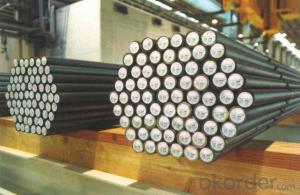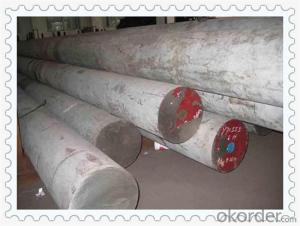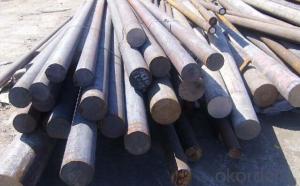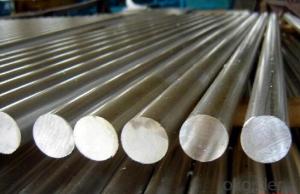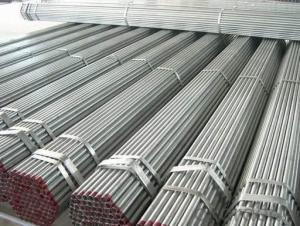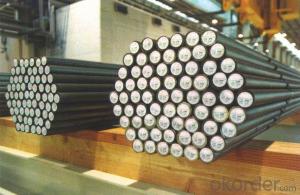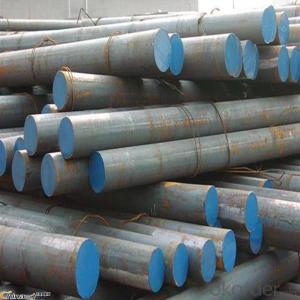AISI 4140 ASTM 42CrMo4 Steel Round Bar
- Loading Port:
- China main port
- Payment Terms:
- TT OR LC
- Min Order Qty:
- 30 m.t.
- Supply Capability:
- 10000 m.t./month
OKorder Service Pledge
OKorder Financial Service
You Might Also Like
Specification
AISI 4140 ASTM 42CrMo4 Steel Round Bar
Product Information:
Material: AISI 4140 hot rolled alloy steel bar
Diameter: 10mm-300mm
Length: 3000mm-12000mm Straightness: 3mm/M max
Process: EAF + LF + VD +rolled + Heat Treatment (optional)
Delivery condition: Hot rolled + rough machined (black surface after Q/T) + turned (optional)
Delivery Time: 30-45 days
MOQ: 25 tons
Heat treatment: Normalized / Annealed / Quenched / tempered
Technical Data: According to the customer's requirement of Chemical Composition, Physical Properties and Mechanical Testing
Test: Ultrasonic test according to SEP 1921-84 G3 C/c
Marking: Grade, heat NO, length will be stamped one each bar with required color
Application: Statically and dynamically stressed components for vehicles, engines and machines, parts of larger cross-sections, crankshafts, gears.
Product Overviews:
| Product Name | Typical Grades | Diameter(mm) | Standard adopted |
| Carbon Steel | 20 (1020/S20C/C22) | Ø16-Ø300 | GB/SAE/JIS/DIN |
| 40 (1040/S40C/C40) | |||
| 45 (1045/S45C/C45) | |||
| Bearing Steel | GCr9 (51100/SUJ1) | Ø12-Ø250 | |
| GCr15 (52100/SUJ2/100Gr6) | |||
| GCr9SiMn (A485-Gr.1/SUJ3) | |||
| Cr-Mo Steel | 20Cr (5120/SCr420H/20Cr4) | Ø12-Ø250 | |
| 40Cr (5140/SCr440/41Cr4) | |||
| 42CrMo(4140/SCM440/42CrMo4) | |||
| Gear Steel | 20CrNiMo | Ø16-Ø600 | |
| 20CrMn(5115/SMnC420/20MnCr5) | |||
| 20CrNiMo(8620/SNCM220/20CrMiMo2) |
Product Show:

Our Advantages:
· Industry experience over 20 years.
· Shipment of goods -More than 70 countries worldwide.
· The most convenient transport and prompt delivery.
· Competitive price with best service.
· High technical production line with top quality products.
· High reputation based on best quality products.
With our experienced, enthusiastic and dynamic staffs, we assure to bring you the products with best quality, reasonable prices and good after-sales services under the motto: Friends First, Business After.
Communication, Experience, Expertise and Best efforts are our Promises to you.
- Q: How is high-temperature steel used in power generation equipment?
- High-temperature steel is used in power generation equipment due to its exceptional heat resistance properties. It is specifically employed in components such as boiler tubes, turbine blades, and exhaust systems, where intense heat and pressure are present. This steel's ability to withstand extreme temperatures ensures efficient energy conversion and maximizes the overall performance and reliability of power generation equipment.
- Q: What are the different quality control measures for special steel production?
- There are several quality control measures for special steel production, including thorough material inspections, precise chemical composition analysis, stringent dimensional and shape control, non-destructive testing methods such as ultrasonic and magnetic particle inspections, and rigorous mechanical property evaluations. Additionally, heat treatment processes and surface treatments are closely monitored to ensure the desired properties and surface finish of the special steel. Continuous monitoring and quality checks are essential throughout the production process to maintain the highest standards and meet customer requirements.
- Q: How does stainless steel contribute to the automotive industry?
- Stainless steel contributes to the automotive industry by providing superior strength, durability, and corrosion resistance. It is commonly used in the manufacturing of exhaust systems, body panels, and structural components, increasing the lifespan and safety of vehicles. Its high heat resistance also makes it ideal for engine parts, resulting in improved performance and efficiency.
- Q: What are the different machining techniques used for special steel?
- Some of the different machining techniques used for special steel include turning, milling, drilling, grinding, and honing. These techniques are used to shape and finish the special steel according to specific requirements and tolerances. Each technique has its own advantages and is chosen based on factors such as the type of special steel, desired dimensions, surface finish, and the complexity of the part being machined.
- Q: What are the different types of corrosion-resistant steel?
- There are several types of corrosion-resistant steel, including stainless steel, weathering steel, and galvanized steel. Stainless steel is the most common type, known for its high resistance to corrosion due to the presence of chromium. Weathering steel forms a protective rust-like layer, providing long-term corrosion resistance. Galvanized steel is coated with a layer of zinc, which acts as a barrier against corrosion.
- Q: What are the environmental impacts of producing special steel?
- The environmental impacts of producing special steel can include air pollution from emissions released during the steelmaking process, such as carbon dioxide, sulfur dioxide, and nitrogen oxide. Additionally, the extraction of raw materials for steel production, such as iron ore and coal, can result in deforestation, habitat destruction, and water pollution. The energy-intensive nature of steel production also contributes to greenhouse gas emissions and climate change. Proper waste management and implementation of sustainable practices can mitigate some of these environmental impacts.
- Q: How is mold steel used in injection molding?
- Mold steel is used in injection molding as it possesses high toughness, wear resistance, and heat resistance properties. It is used to manufacture molds or dies that are used in injection molding machines to shape molten plastic into desired products. The mold steel is capable of withstanding the high pressure and temperature of the molten plastic, ensuring the production of precise and high-quality plastic components.
- Q: What are the different carburizing techniques used for special steel?
- There are several carburizing techniques used for special steel, including gas carburizing, pack carburizing, liquid carburizing, and vacuum carburizing. Each technique involves introducing carbon into the surface of the steel to enhance its hardness and wear resistance. Gas carburizing involves heating the steel in a controlled atmosphere of carbon-rich gas, while pack carburizing entails surrounding the steel with a mixture of carbon-rich material and heating it. Liquid carburizing involves immersing the steel in a bath of molten salts or other carbon-rich liquid, and vacuum carburizing utilizes a low-pressure environment to introduce carbon into the steel's surface. These techniques are chosen based on the specific requirements of the steel and the desired end properties.
- Q: What is the role of chromium in special steel?
- The role of chromium in special steel is to provide enhanced corrosion resistance, increased hardness, and improved strength. It forms a protective layer on the surface of the steel, known as chromium oxide, which prevents the steel from rusting or corroding. Chromium also helps in improving the steel's ability to withstand high temperatures and maintain its structural integrity.
- Q: What are the specific requirements for special steel used in the power transmission industry?
- The specific requirements for special steel used in the power transmission industry include high strength and durability to withstand heavy loads and vibrations, excellent corrosion resistance to withstand harsh environmental conditions, good electrical conductivity for efficient power transmission, and precise dimensional accuracy to ensure proper fit and alignment in power transmission components. Additionally, special steel used in this industry needs to have excellent fatigue resistance to withstand cyclic loading and prolonged stress, as well as good thermal stability to handle high temperatures generated during power transmission.
Send your message to us
AISI 4140 ASTM 42CrMo4 Steel Round Bar
- Loading Port:
- China main port
- Payment Terms:
- TT OR LC
- Min Order Qty:
- 30 m.t.
- Supply Capability:
- 10000 m.t./month
OKorder Service Pledge
OKorder Financial Service
Similar products
Hot products
Hot Searches
Related keywords
